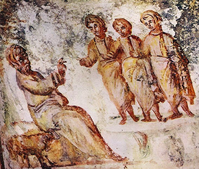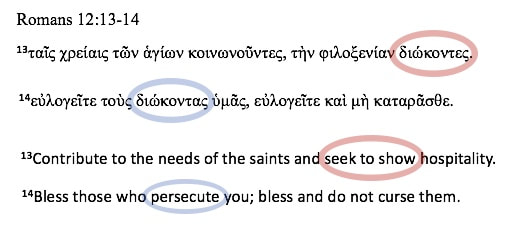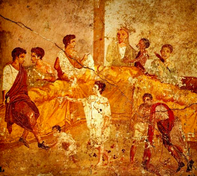 From the Greek geek (be patient, it's a rough cut): While most translations of Romans 12:9-13 are just fine, some nuances are lost (as those who speak other than English sometimes say) in translation. Here’s one . . . from verse 9 that’s worth noting. “Let love be genuine. Abhor what is evil; hold fast to what is good” (Romans 12:9, ESV).
There are no verbs. We (even they) had to provide them, but should not be at the expense of hearing how Paul set out his written words. And, in this case (v. 9), the two following participles should be heard as “how” (thus, my “by”) “the love” is “sincere,” that is, the manner in which “love” is shown to be sincere is in abhorring evil, holding fast the good. This gives Christian (or should I should, given the context, church) love content--action. And, also noting that Paul’s consistent use afterward of a specific, repeated grammatical construction (i.e., for other Greek geeks, a string of dative phrases—again with no verbs) probably indicates what “good sincere love acts like”: This is what church good love looks like: “Love one another with brotherly affection. Outdo one another in showing honor. Do not be slothful in zeal, be fervent in spirit, serve the Lord. Rejoice in hope, be patient in tribulation, be constant in prayer. Contribute to the needs of the saints” (ESV). Note: Of course, English versions need to iron or smooth out Greek-to-English renderings to make it more readable . . . most of our English translations, if watching all such linguistic and grammatical nuances of a language (i.e., the koine Greek of the NT) that was written to be heard and not read (so much) would be quite choppy and tiresome to just read . . . but sometimes it’s good to get at the Greek that was to be heard (and not just read).
0 Comments
 Working on Roman’s 12 for Sunday. There is a little creative punning by Paul in his Romans 12 (ESV). Most think of a pun as some form of joke or humorous quip; however a pun is a word-play, also called paronomasia. A pun can be both visual (the form of the word) and auditory (hearing), a form of word-play that suggests two or more meanings played off each other for rhetorical effect, harnessing the multiple meanings, for an intended humorous or rhetorical effect. Here in Romans 12, Paul uses such punning to emphasize the importance and significance of the gathered-church. “Contribute to the needs of the saints and seek to show hospitality” (v. 13). Here is my own translation, which reflects Paul's original word order and the reading of it out loud. Sometimes hearing it is the best way to catch the intent: “The needs of the saints, contribute; hospitality, intentionally pursue. Bless those who persecute, bless and do not curse” (Rom 12:13-14). Three things worth noting:
Until recently, I have always read (rather poorly I will confess) the first few verses of Romans 12 very individualistically. This was how I read them and, for the most part, how these verses were preached and taught to me. Typically, as I have, these verses are taken as words to individual Christians to present their bodies as a living sacrifice, thus read (and heard as), "You, Christian, present your body as a living sacrifice . . ." And, as well, these as verses are disenchurched (yes, I invented a word) from Romans 12 as a whole and are read (heard) apart from their most likely venue of context, the gathered-church . . .
Furthermore, Paul's instruction in the following verses all the way through the rest of the chapter (vv. 3–21) and, really, to the end of the Letter (chapters 13-16), are all about church, specifically the gathered-church. So . . . let's read Romans 12:1–2 as church . . . the church is not to be conformed to this world, but be transformed . . . The translators who translate "your mind" in v. 2b (by the renewal of your mind) don't help interpretive matters, for there is no "your" in Paul's original text, which allows a different read from the text (". . . but by the renewing of perception, imagination, thinking . . .") with the church as a gathered group sitting in dinning rooms throughout Rome, gathered as church for instruction, worship, and fellowship. Of course individuals need to apply this, but the context is the church, so it is a call to the gathered-church, together: true mark's of the gathered-church are forthcoming in Romans 12:9-21. A far better read here. |
AuthorChip M. Anderson, advocate for biblical social action; pastor of an urban church plant in the Hill neighborhood of New Haven, CT; husband, father, author, former Greek & NT professor; and, 19 years involved with social action. Archives
February 2024
Categories
All
|
Pages |
More Pages |
|


 RSS Feed
RSS Feed